1867 & All That is a lively and riveting romp through some of the most important stories from Canadian political history. The first season retold the stories of the Rebellions of 1837 and 1838 and the long fight in the 1840s over this strange but fundamental Canadian concept called “responsible government.”
Now Season Two has just launched.
This season 1867 & All That recounts the tumultuous road that led to the creation of Canada. Starting with the bitter ethnic and religious fights in the 1850s in the Province of Canada, it introduces the key personalities and events which led an unlikely group of friends and foes to temporarily set aside their differences and forge a country.
The past has a funny way of looking like the present and 1867 & All That shows that cancel culture and brawling fights over contentious speakers didn’t originate with Twitter. In the years before Confederation, crowds shouted down speakers, they smashed windows, and even, on one occasion, trained a cannon on a Catholic Church to prevent a St. Patrick’s Day parade.
Season Two of 1867 & All That contains these stories and more. But it starts with the little remembered story of an Italian priest who riled and divided Canadians more than Jordan Peterson and Dave Chappelle combined.
Here’s a taste of episode one:
At some point in that summer of 1853, it must have occurred to Alessandro Gavazzi that this Canadian trip hadn’t been such a good idea. If I had to guess I’d say the moment of doubt might have come when he found himself mounted atop a high church podium in Quebec City, clasping a wooden chair, swinging it wildly about, trying to defend himself against a mob of irate Catholics who wanted to beat him senseless.
Or maybe not.
Alessandro Gavazzi was no timid man. The Italian liberal nationalist was a revolutionary after all. He had fled his homeland after the failed 1848 revolutions. Gavazzi retreated to London and then to North America, making his living as a public orator. His favourite topic that summer of 1853 was the evils of the Papacy. Gavazzi was a former priest—with the emphasis on former. He still donned clerical robes as a man of God, just no longer as a Catholic. Feeling betrayed by Pope Pius IX who reformers like Gavazzi felt had betrayed the revolution in Italy, Gavazzi had left the church and become a protestant. Like many converts to a new faith—or maybe like ex-smokers—the new convert soon became the most vitriolic detractor of his former faith and practice.
His speaking tour of British North America began in Toronto and the crowds in that thoroughly protestant city welcomed him heartily. But after Toronto, he travelled to the decidedly Catholic precincts of Quebec City—that fortified bastion of the French fact in North America founded hundreds of years ago after Champlain’s first visit. And Quebec’s French Catholics – as well as its many recently arrived Irish Catholics – were not pleased he had come.
In his first public talk he had regaled audiences with his anti-Catholic speeches to much excitement. But the next day, with rumours swirling in the city that local Catholics planned to retaliate, Gavazzi had to scramble to find another church in which to speak after his first host reluctantly cancelled his appearance. Another church opened its doors to him and so Gavazzi spoke on what he titled the Catholic church’s “ancient and modern inquisition.”
That night, crowds of angry Catholics gathered outside the church even as, inside, Gavazzi offered lurid descriptions of the horrid torture practices of the church during the inquisition. He then turned to the controversial subject of Ireland and the protestant-Catholic fights in that part of the British Isles—a subject bound to be more difficult in Quebec, what with the large numbers of recent famine Irish migrants. That’s when someone in the audience shouted:
“It’s a lie!” And then “Turn him out!”
Perhaps that had been a signal because, at just that moment, the crowd outside the church began its assault. Stones crashed through the windows and rioters burst through the doors. Chaos erupted as rioters attempted to storm the pulpit and pull Gavazzi down. That’s when he grabbed a chair, employing it as a weapon. Others in the crowd hurled songbooks at him. Protestants and Catholics shouted and shoved each other in a general melee. Several angry detractors pushed their way through the crowd and up to the pulpit, heaving Gavazzi off his perch from a height of fifteen feet. Luckily, he landed on the crowd below, their bodies softening his fall. He got to his feet and was helped to safety.
Yet as Gavazzi limped away into the night, the divisions of the Canadas played themselves out in tumultuous fashion amid shouts and shoving on the streets of Quebec.
Recommended for You
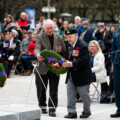
If we don’t make young Canadians care about our WW2 veterans, their sacrifices will soon die with them
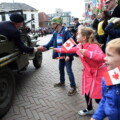
Our peace was hard-won—and we must never stop fighting for it
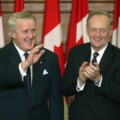
‘Intoxicated by the power’: What it’s like to lead Canada as prime minister

‘Wake up, stand up, and speak out before it’s too late’: Why non-Jews should care about antisemitism too
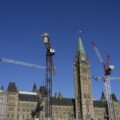
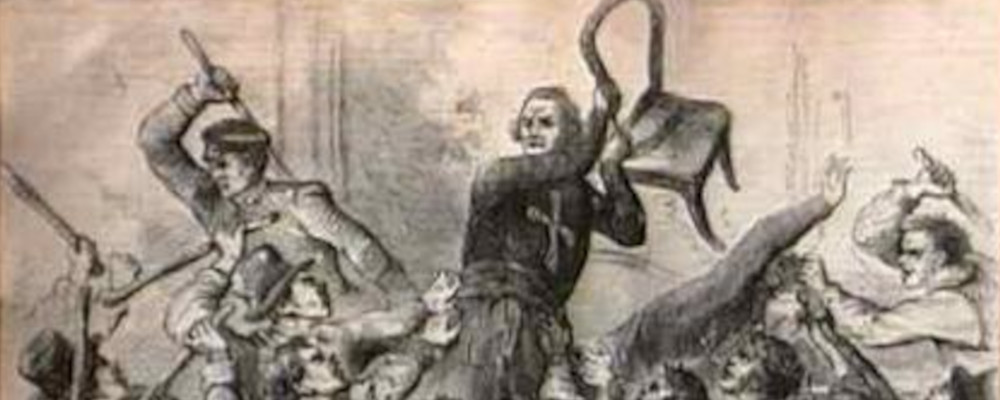


Comments (0)